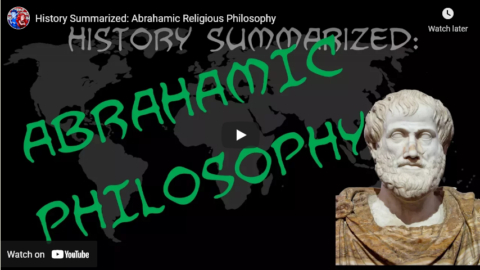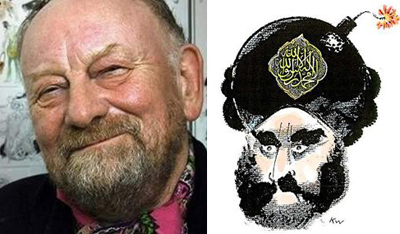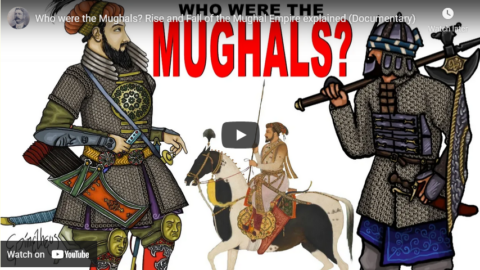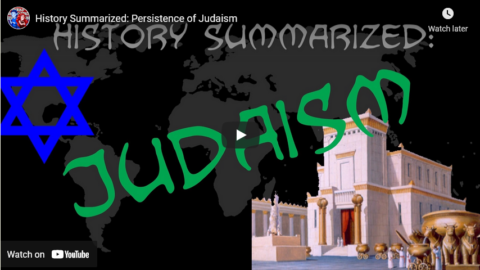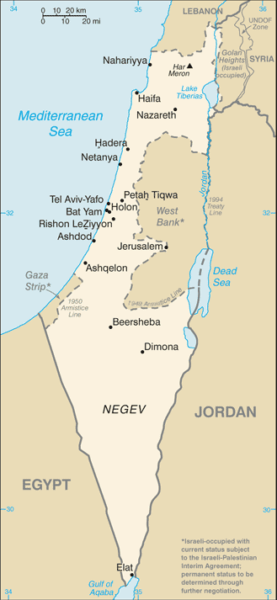Overly Sarcastic Productions
Published 12 Jun 2017Alrighty, here goes nothing. With three religions’ individual histories in the bag, and one campaign each by the Muslims and Christians covered on this channel, let’s see if we can find a way to all get along.
RELEVANT LINKS:
History Summarized: Islam: https://youtu.be/Uvq59FPgx88?
History Summarized: Christianity: https://youtu.be/A86fIELxFds?
History Summarized: Judaism: https://youtu.be/aKB6WduDwNE?
History Summarized: Christianity, Judaism, and the Muslim Conquest https://wp.me/p2hpV6-gQv
History Summarized: The Crusades: https://youtu.be/wZhyDIIkeLoPATREON: www.patreon.com/user?u=4664797
MERCH LINKS:
Shirts – https://overlysarcasticproducts.threa…?
All the other stuff – http://www.cafepress.com/OverlySarcas…?Find us on Twitter @OSPYouTube!
August 3, 2021
History Summarized: Abrahamic Religious Philosophy
July 27, 2021
History Summarized: The Crusades
Overly Sarcastic Productions
Published 11 Jun 2017Making a video exclusively about the crusades? That’s a bold strategy, Blue, let’s see how it pays off.
RELEVANT LINKS:
History Summarized: Islam: https://youtu.be/Uvq59FPgx88
History Summarized: Christianity: https://youtu.be/A86fIELxFds
History Summarized: Judaism: https://youtu.be/aKB6WduDwNE
History Summarized: Christianity, Judaism, and the Muslim Conquest https://wp.me/p2hpV6-gQv
History Summarized: Venice (Part 2): https://youtu.be/byMleAJ5kRs
History Summarized: Byzantine Empire: https://youtu.be/-ucHQVu8Dw0History Summarized: Abrahamic Religious Philosophy: https://youtu.be/B7myRRt0Mn8
PATREON: www.patreon.com/user?u=4664797
MERCH LINKS:
Shirts – https://overlysarcasticproducts.threa…
All the other stuff – http://www.cafepress.com/OverlySarcas…Find us on Twitter @OSPYouTube!
July 25, 2021
The plight of the Uyghurs in China
In this week’s excerpt from his full Weekly Dish, Andrew Sullivan considers the Chinese government’s ongoing suppression of the Uyghur minority:
There’s a story in a recent Atlantic memoir by a Uyghur refugee that lingers in the mind. The Chinese authorities in Xinjiang Province now regard the possession of any religious literature, including the Koran, as prima facie evidence of terroristic activities. Terrified Uyghurs in Urumqi, the regional capital, have learned these past few years to quickly dispose of any such items — some throwing out books into the streets overnight so they could not be traced to their households. But one old man in his seventies forgot about a Koran he had possessed, and, coming upon it late, was too scared to hand it over, so threw it into a river. Alas,
the authorities had installed wire mesh under all bridges, and when the mesh was cleaned, the Quran was found and turned over to the police. When officers opened it, they found a copy of the old man’s ID card: In Xinjiang, the elderly have a habit of keeping important documents in frequently read books, so that they are easily found when needed. The police tracked down the old man and detained him on charges of engaging in illegal religious activities. He was sentenced to seven years in prison.
The “prisons” this elderly, devout Muslim was shipped off to now have a capacity of around one million people. They have been built at breakneck speed. Buzzfeed News has found “more than 260 structures built since 2017 and bearing the hallmarks of fortified detention compounds.” The more recent building suggests they are going to become permanent parts of a bid to wipe Uyghur culture from the face of the earth.
The Atlantic story helps you understand how eerily reminiscent this campaign is to the early Nazi-era treatment of Jews, all the way down to the initial disbelief that the genocidal campaign was beginning, to the slow creeping oppression, the sudden new checkpoints and security procedures, the separation of Han and Uyghurs, knocks on the door at night, the attempts of some to escape without detection, and the sudden disappearances of friends, relatives, co-workers — never to be heard of again.
We cannot know for sure what happens inside the camps, but reports from survivors include torture, starvation, force-feeding, solitary confinement, and brainwashing. And in some ways, the entire region is now an open-air prison: security cameras are everywhere, the imprisoned are pressured to incriminate others, police go house to house searching for illicit materials, mosques and neighborhoods are razed, Uyghur language is banned, phones monitored, face recognition technology is ubiquitous. Family members, waiting for their turn to be arrested, leave notes like this one from a husband to his wife:
If they arrest me, don’t lose yourself. Don’t make inquiries about me, don’t go looking for help, don’t spend money trying to get me out. This time isn’t like any time before. They are planning something dark. There is no notifying families or inquiring at police stations this time … I’m not afraid of prison. I am afraid of you and the girls struggling and hurting when I’m gone. So I want you to remember what I’m saying.
It’s important to note that the concentration camps for Muslims in China are not extermination camps. (At least not yet. “They are planning something dark” is not a sentence one ever wants to read.) But it is the greatest, systematic detention of a religious minority since the Second World War, championed by a newly emerged dictator-for-life, Chinese President Xi. And it is not going to stop any time soon.
July 20, 2021
Kurt Westergaard, RIP
Mark Steyn on the life and work of cartoonist Kurt Westergaard:
Kurt Westergaard and I were successive winners of the Danish Free Press Society’s Sappho Award. I was very flattered to find myself in his company, but couldn’t honestly say I deserved to be. Kurt was one of the bravest men of our time – not because he was inclined to bravery, but simply because, when it was required, he met the challenge and never backed down.
Sixteen years ago Flemming Rose of the Danish newspaper Jyllands-Posten decided to conduct a thought experiment in public after an author casually revealed that he couldn’t find any Danish artist willing to illustrate his book about “the Prophet Mohammed” (as the BBC now routinely styles him). So Flemming called twelve cartoonists and invited them to depict the late Prophet. Kurt Westergaard’s cartoon was the memorable one, and the one you recall as the years roll by. It was a pithy visual jest: Mohammed’s turban as a bomb with a lit fuse. See picture at top right.
“I attempted to show that terrorists get their spiritual ammunition from parts of Islam, and with this spiritual ammunition, and with dynamite and other explosives, they kill people,” Kurt told my old newspaper The National Post a few years back. “I showed this in a cartoon and what happened? They want to kill me, so I think I was right.”
An otherwise courtly, cultured Dane, Kurt Westergaard had a somewhat arresting dress code, preferring le rouge et le noir, the colors of anarchists, although, as a practical matter, it’s hard for a man of advanced years to carry off red trousers, whatever his motivation. He would qualify his pantaloons by explaining that he was not a political anarchist but a cultural one. Still, one can gather from the garb alone that Westergaard was no “right-winger”. Like most of the men and women I have shared a stage with in Europe this century, he was an old Sixties radical sufficiently principled to think the same kind of jokes he’d applied to church, monarchy, parliament and every other societal institution should also be applied to Islam. He never wanted to be a “free speech hero”, but gamely bore the burthen once it had been dropped on him. He certainly never wanted to be world-famous, albeit more so in Mogadishu than Manhattan and Lahore than Los Angeles. It cost him a comfortable retirement, weakened his health, and an ever more craven culture denied him the consolations of monetary exploitation. When I expressed sympathy, he laughed and said he’d do the same cartoon all over again even knowing what he was in for.
The blood lust began with a trio of imams on the make shopping the twelve cartoons (plus three cruder fakes) round the Muslim world, and leaving it to the usual Islamonutters to take it from there: In nothing flat, over two hundred people were dead – which meant that CNN & Co were obliged to cover the story. They did so by modifying Westergaard’s cartoon, with Mohammed’s face pixilated, as if he’d entered the witness protection programme. If only. In reality, it was that dwindling band of people who believe in free speech – and, indeed, free speech itself – that found itself in the witness protection programme.
History Summarized: Christianity, Judaism, and the Muslim Conquest
Overly Sarcastic Productions
Published 10 Jun 2017It’s all coming together now. With the individual histories of Islam, Christianity, and Judaism covered, Blue puts it together to summarize how the three interacted in the centuries leading up to the Crusades. The next video will cover the Crusades. Hype.
RELEVANT LINKS:
History Summarized: Islam: https://youtu.be/Uvq59FPgx88
History Summarized: Christianity: https://youtu.be/A86fIELxFds
History Summarized: Judaism: https://youtu.be/aKB6WduDwNEHistory Summarized: The Crusades: https://youtu.be/wZhyDIIkeLo
History Summarized: Abrahamic Religious Philosophy: https://youtu.be/B7myRRt0Mn8PATREON: www.patreon.com/user?u=4664797
MERCH LINKS:
Shirts – https://overlysarcasticproducts.threa…
All the other stuff – http://www.cafepress.com/OverlySarcas…
July 15, 2021
Goodbye Lenin, Hello Jazz! | B2W:ZEITGEIST! I E.22 Winter 1924
TimeGhost History
Published 14 Jul 2021The winter of 1924 sees the death of not only Vladimir Lenin but also the Ottoman Caliphate. However, it also sees something fresh and completely unique enter the American mainstream. George Gershwin has given the Jazz Age a soundtrack.
(more…)
July 3, 2021
Who were the Mughals? Rise and Fall of the Mughal Empire explained
Epimetheus
Published 20 Oct 2019Who were the Mughals? Rise and Fall of the Mughal Empire explained (Documentary)
The Mughal empire’s history from Babur to the fall in 1857.
This video and others like it are sponsored by my Patrons over on patreon.
https://www.patreon.com/Epimetheus1776
June 29, 2021
History Summarized: Rise of Islam
Overly Sarcastic Productions
Published 16 Nov 2016Note to viewers: This video contains images of the *Blue Mosque* in Istanbul, which is Not the Hagia Sophia. The Hagia Sophia was a church, later converted into a mosque, but the Blue Mosque, which, to be fair, looks fairly similar to the Hagia Sophia, is a totally different building, and was built by the Ottomans.
HE LIVES! … by at least a few medical metrics. Blue went on a huge training montage for the entirety of Autumn and is back to talk about the history of Islam!
If you have any questions about anything in the video and would like to learn more, leave them in the comments and I’ll do my best to answer!
MERCH LINKS:
Shirts – https://overlysarcasticproducts.threa…
All the other stuff – http://www.cafepress.com/OverlySarcas…Follow us on Twitter @OSPYouTube!
June 24, 2021
First Arab-Israeli War 1948 – Political Background – COLD WAR
The Cold War
Published 31 Aug 2019Our series on the history of the Cold War period continues with a documentary explaining the political background of the First Arab-Israeli War of 1948.
To learn about the military events of this conflict, go to the Kings and Generals channel
Consider supporting us on Patreon: https://www.patreon.com/thecoldwar
June 20, 2021
Is racism a bigger problem than terrorism?
With Americans being urged to report on “radicalized” friends and family by the government and white supremacy being called the greatest threat, have we reached the point that being seen as racist is worse than allowing a terrorist to kill many people? The inquiry into the Manchester Arena bombing shows that’s exactly the state most of the western world is in:

“Manchester Arena Bomb (22 May 2017) – Daily Mirror – 19 dead in pop concert ‘suicide bomb'” by Bradford Timeline is licensed under CC BY-NC 2.0
The independent inquiry into the Manchester Arena bombing of May 2017, in which 22 pop fans were killed by an Islamist extremist, has published the first volume of its report. It makes for chilling reading. The inquiry has found there were numerous “missed opportunities” to confront Salman Abedi, the bomber, and potentially stop him from detonating the device in his rucksack. Most chilling of all is the reason given by one of the key security guards on patrol that evening as to why he failed to question Abedi. He was worried, he said, that asking a brown-skinned man why he was hanging around the arena might be construed as racist.
Take that in. There was a very shifty-looking young man around the foyer and mezzanine of the Manchester Arena towards the end of an Ariana Grande concert, carrying a “bulging” rucksack so large he “struggled” under the weight of it, and a security guard was reluctant to confront him lest he be accused of racism. In the words of the report, this was a significant “missed opportunity”. The “inadequacy” of the security guard’s response to the presence of a highly suspicious individual was one of the many misjudgements made on that black, fateful night, the report says. Is it possible that the fear of being thought of as racist is screwing up everyday life, and even hindering sensible action in threatening situations?
To be clear, the security guard who was cagey about questioning Abedi is not responsible for the failure to stop Abedi from detonating his device. The first volume of the inquiry’s report – which covers security at and around the arena on the night of 22 May 2017 – criticises certain individuals, including the security guard, for not doing their jobs diligently enough. But it says that it was the organisations responsible for security at the arena – the arena’s own security firm and also the British Transport Police – that were “principally” to blame for the “missed opportunities”. It also makes the reasonable point that it is impossible to know what would have happened if Abedi had been confronted. It proposes that there may still have been loss of life – if, for example, he had detonated his device while being questioned – but that it would have been less severe than the horrors that shortly unfolded.
It is disturbing to read the list of “missed opportunities”. Abedi was in the arena for more than an hour and a half before he detonated his bomb. He arrived at 20.51 and blew himself up at 22.31, as the concert attendees started to leave. In that time, this young man with a massive rucksack was seen by numerous people. He was described by some of them as “nervous” and “fidgety”. He looked out of place – his age “meant that he did not fit the demographic of a parent waiting for a child”, as the inquiry says. And yet as a result of individual and organisational failure – including, the inquiry says, insufficient training of the security guards on duty that night – the message didn’t get through that there was a fidgeting, agitated man with a bulging rucksack hanging around for 90 minutes at the exit area of a venue that was largely packed with children and teenagers.
Remarkably, some people at the arena who saw Abedi thought to themselves that he was a suicide bomber. Christopher Wild and his partner, Julie Whitley, who were picking up Whitley’s daughter, discussed the possibility that Abedi had a bomb in his rucksack. Wild actually did confront Abedi and asked him what was in his bag. Abedi nervously brushed him off. Wild reported his concerns to security guards at 22.15 – 16 minutes before the explosion – but he was “fobbed off”. Another parent said the security guards were “really quite dismissive” of Wild’s concerns. It is deeply disturbing that parents at the arena rightly suspected Abedi was a bomber and yet nothing was done to challenge or remove him.
June 15, 2021
History Summarized: Persistence of Judaism
Overly Sarcastic Productions
Published 7 Apr 2017Gooooood morning everybody! Today, Blue finishes the trilogy of Abrahamic religions with a video summarizing the history of the Hebrew people and the Jewish faith. There’s a lot of ground to cover, so fasten your seatbelts for a twenty-minute rundown of the facts, the theories, and the ever-so-popular misconceptions!
Look forward to next time, when Blue brings it all together to talk about Religious Wars and Religious Philosophy!
PATREON: www.patreon.com/user?u=4664797
MERCH LINKS:
Shirts – https://overlysarcasticproducts.threa…
All the other stuff – http://www.cafepress.com/OverlySarcas…Find us on Twitter @OSPYouTube!
June 1, 2021
Rise and Fall of the Sikh Empire explained in less than 7 minutes
Epimetheus
Published 8 Oct 2019Rise and Fall of the Sikh Empire explained in less than 7 minutes Sikh history documentary
This video covers Sikh history from the Guru Nanak till the fall of the Sikh Empire.
This video and others like it are sponsored by my Patrons over on patreon.
https://www.patreon.com/Epimetheus1776
May 27, 2021
“Are you an ally of an all-powerful white supremacist, colonialist apartheid regime led by baby-killing oppressors, the likes of whose evil the world has never seen?”
Why, yes. Yes I am, Barbara Kay. And you should be too:
Nobody with eyes to see can press on with the myth that this is a political conflict. The anti-Semitism that lurks behind obsessive Israel-bashing can no longer be credibly passed off as “criticism of Israel”. It’s not about Israel and never was. It’s about those maddening Jews. Wherever they are, they make trouble. What is it with their stubborn insistence on their right to live and flourish in their homeland, when they know they are not wanted there?
Never mind the historical facts surrounding Jews’ indigenous rights, or the painstaking legal journey to national sovereignty (along with other newly minted Middle Eastern countries like Iraq and Syria, both of which have appalling human rights records, but never have their right to exist questioned). Treaties and international law are too dull, nuanced and complex. They take time and effort to understand. It’s very taxing for the brain. Narrative, though, takes no time at all to absorb. Stories of good and evil are simple, unnuanced and satisfyingly emotive.
If you attend to the myth-mongering on social media, it seems your choice is stark. Are you an ally of an all-powerful white supremacist, colonialist apartheid regime led by baby-killing oppressors, the likes of whose evil the world has never seen? Or are you a decent, compassionate human being, committed to social justice and ready to lend your support to those infamous Zionist monsters’ powerless, oppressed, racialized victims, who are languishing in their open-air prisons?
It’s a tough choice for progressive Jews. Before 1967, living with oneself as a Jew was easy. Socialist Israel was little David then and the massed hostile Arab states were Goliath. Even Bernie Sanders enjoyed his time on a kibbutz in 1963. (Mind you, that particular kibbutz, Sha’ar Ha’amakim, was so far left, one of its members was convicted of spying for the Soviet Union.)
Then those upstart Jews dared to win a war against incredible odds and had the chutzpah to take back territory that had been stolen from them in the 1948 War of Independence. The pivot from victim to victor, from powerlessness to power, was the kiss of death for their support from the left.
May 26, 2021
The not-so-hidden subtext of One Thousand And One Nights
At least, that’s how Scott Alexander at Astral Codex Ten opens this review of (an abridged version) of One Thousand And One Nights:
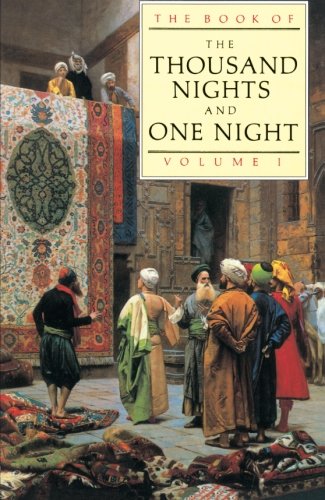
One of many different covers of various editions of this book, but almost certainly not the edition reviewed here.
One Thousand And One Nights is a book about love, wonder, magic, and morality. About genies, ape-people, and rhinoceroses who run around with elephants impaled on their horns. About how to use indexical uncertainty to hack the simulation running the universe to return the outcome you want. But most of all, it’s a book about how your wife is cheating on you with a black man.
Nights stretches from Morocco to China, across at least four centuries — and throughout that whole panoply of times and places, your wife is always cheating on you with a black man (if you’re black, don’t worry; she is cheating on you with a different black man). It’s a weird constant. Maybe it’s the author’s fetish. I realize that Nights includes folktales written over centuries by dozens of different people — from legends passed along in caravanserais, to stories getting collected and written down, to manuscripts brought to Europe, to Richard Burton writing the classic English translation, to the abridged and updated version of Burton I read. But somewhere in that process, probably multiple places, someone had a fetish about their wife cheating on them with a black man, and boy did they insert it into the story.
Our tale begins in Samarkand. One day the king, Shah Zaman, comes home unexpectedly and sees his wife cheating on him with a black man. He kills her in a rage, then falls sick with grief, and is taken to the palace of his brother, King Shahryar of Persia. While there, he sees King Shahryar’s wife cheat on him with a black man. He tells King Shahryar, who kills his wife in a rage too, then also falls sick with grief. The two grief-stricken kings decide to wander the world, expecting that maybe this will help in some way.
They come across a mighty king of the genies, and the brothers hide lest he see them and kill them. The genie falls asleep, and the genie’s wife finds them and demands they have sex with her or she’ll kill them. They have sex, and all the while, the genie’s wife is boasting about how even the king of the genies can’t prevent his wife from cheating. The two kings find this experience salutary — apparently the problem isn’t specific to them, it’s just an issue with the female sex in general. So they go back to the palace and everyone lives happily ever … no, actually, King Shahryar vows that he will bed a new woman every night, then kill her the following morning, thus ensuring nobody can ever cheat on him again.
So for however many years, King Shahryar beds a new woman every night, then kills her in the morning. After a while the kingdom begins to run dangerously low on women. The vizier frets over this, and his daughter Scheherazade hears him fretting. She develops a plan, and volunteers to be the king’s victim that night. After having sex, she tells the king a story. At the end, she says it’s too bad she’s going to die the next morning, because she knows other stories which are even better. Perhaps if the king spared her life for one night she could tell some of those too.
(I’d always heard that she leaves him at a cliff-hanger and makes him spare her to find out how it ends, which I think makes a better story, but this isn’t how the real Arabian Nights works).
Scheherazade’s stories are set in an idealized Middle East. The sultans are always wise and just, the princes are always strong and handsome, and almost a full half of viziers are non-evil. Named characters are always so beautiful and skilled and virtuous that it sometimes gets used it as a plot device — a character is separated from his family member or lover, so he wanders into a caravanserai and asks for news of someone who is excessively beautiful and skilled and virtuous. “Oh yes,” says one of the merchants, “I talked to a traveler from Cairo who said he encountered the most beautiful and skilled and virtuous person he’d ever seen in a garden there, he couldn’t shut up about them for days” — and now you know your long-lost brother must be in Cairo. In one case, a woman went searching for her long-lost son, tasted some pomegranate jam in Damascus, and immediately (and correctly!) concluded that only her son could make pomegranate jam that good. She demanded to know where the merchant had gotten the jam, and the trail led to a happy reunion.
The most common jobs in Idealized Middle East are sultan, merchant, poor-but-pious tailor, fisherman, merchant, evil vizier, sorcerer, merchant, thief, person who gets hired to assist a sorcerer because they have the exact right astrological chart to perform some otherwise-impossible ritual, and merchant. Of these, merchant is number one. Whatever else you’re doing — sailing, stealing, using your perfect astrological chart to enter a giant glowing door in the desert mysteriously invisible to everyone else — you’re probably also dealing goods on the side. The only exceptions are Moroccans (who are all sorcerers), Zoroastrians (who are all demonic cannibals), and Jews (who are all super-double merchants scamming everyone else). Also maybe the 5 – 10% of the Middle Eastern population who witches have turned into animals at any given time.
May 15, 2021
QotD: Military history
Things have changed little today in terms of the exclusive Western monopoly of military history. Six billion people on the planet are more likely to read, hear, or see accounts of the Gulf War (1990) from the American and European vantage points than from the Iraqi. The story of the Vietnam War is largely Western; even the sharpest critics of America’s involvement put little credence in the official communiqués and histories that emanate from communist Vietnam. In the so-called Dark Ages of Europe, more independent histories were still published between A.D. 500 and 1000 than during the entire reigns of the Persian or Ottoman Empire. Whether it is history under Xerxes, the sultan, the Koran, or the Politburo at Hanoi, it is not really history — at least in the Western sense of writing what can offend, embarrass and blaspheme.
Victor Davis Hanson, Carnage and Culture: Landmark Battles in the Rise of Western Power, 2001.

